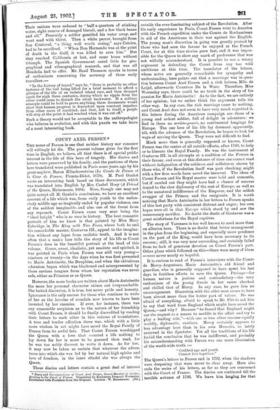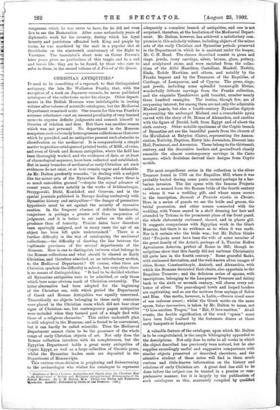COUNT AXEL FERSEN.*
THE name of Fersen is one that neither history nor romance will willingly let die. The present volume gives for the first time in English, we believe, all that there is of special public interest in the life of this hero of tragedy. His diaries and letters were preserved by his family, and the portions of them here translated were published in Paris some years ago by his great-nephew, Baron Klinckowstrom (Le Comte de Fersen et la Cour de France, Firmin-Didot, 1878). M. Paul Gaulot wrote an interesting book based on these documents, which was translated into English by Mrs. Cashel Hoey (A Friend of the Queen, Heinemann, 1894). Here, though one may not quite accept all M. Gaulot's conclusions, we have an excellent account of a life which was, from early youth to the melan- choly middle age so tragically ended by popular violence, one of the saddest imaginable, and also one of the freest from any reproach. Count Fersen came very near being the "ideal knight" who is so rare in history. The best romantic portrait of him we know is that painted by Miss Mary Coleridge in The King with Two Faces, where both he and his remarkable master, Gustavus III., appeal to the imagina- tion without any lapse from realistic truth. And it is not often that a man's face tells the story of his life as Count Fersen's does in the beautiful portrait at the head of this volume. Grave, sweet, idealistic, yet resolute and spirited, it was painted in Paris when Fersen was still very young— nineteen or twenty—in the days when be was first presented to Marie Antoinette, the Dauphine, and when the chivalrous adoration began which was blackened and misrepresented by those envious tongues from whom her reputation was never safe, either as Princess or as Queen.
However, the more books are written about Marie Antoinette the more her personal character shines out irreproachable. She lacked discretion, it is true, but never pride and honesty. Ignorance is the only excuse for those who continue to write of her as the heroine of scandals now known to have been invented by her enemies. If ever, for instance, there was any reasonable suspicion as to the nature of her friendship with Count Fersen, it should be finally discredited by reading their letters to each other in this volume of translations. A true and tender affection there was, which with a little more wisdom in act might have saved the Royal Family of France from its awful fate. That Count Fersen worshipped the Queen with a love that counted a life nothing to lay down for ber is more to be guessed than read, for he was too nobly discreet to write it down. As for her, it may now be taken as certain that whatever the adven- tures into which she was led by her natural high spirits and love of freedom, in the inner citadel she was always the Queen.
These diaries and letters contain a great deal of interest
• Diary and Correspondence of Count Azel Fersen, Grand•Marshal of Sweden, Relating to the Court of Prance. Translated by Katharine Prescott Wormeley. Mutated with Portraits from the Original. London : W. Heinemann. Lgis.]
outside the ever-fascinating subject of the Revolution. After his early experience in Paris, Count Fersen went to America with the French expedition under the Comte de Rochambeau in aid of the Americans in their war against the English. The young man's discretion in going was greatly praised by those who had seen the favour he enjoyed at the French Court, for at this time stories grew fast, and it was impos-
sible for the Queen to show any mark of preference that was not wilfully misunderstood. It is possible to use a wrong argument in defending the Count from any too wild ambitions at this time. The translator of the letters, whose notes are generally remarkable for sympathy and understanding, here points out that a marriage was in ques- tion between Count Axel Fersen and a rich heiress, Mlle. de Leijel, afterwards Countess De la Warr. Therefore, Miss Wormeley says, there could be no truth in the story of his passion for Marie Antoinette ! As to the fact, we are entirely of her opinion; but we rather think the argument tells the other way. In any case, the rich marriage came to nothing, and Count Axel does not seem to have very much regretted it. His letters during the American campaign are those of a young and ardent soldier, full of delight in adventure : we find in them no arrien-pensee, no sentimental longings for Europe. The one love of his life lay dormant, apparently, till, with the advance of the Revolution, he began to look for ways of serving the Queen. They were not difficult to find.
Much more than is generally supposed or known, Count
Fersen was the centre of all outside efforts, after 1789, to help or to liberate the Royal Family. He was the instrument of Gustavus III. in all attempts at a coalition of the Powers in their favour, and even at this distance of time one cannot read without indignation of the coldness and selfishness shown by those who, if the Revolution itself was past checking, might with a few firm words have saved the innocent. The ideas of Count Fersen and his Royal master were bold and romantic, but if carried out they might have had a chance of success denied to the slow diplomacy of the rest of Europe, as well as to the unnatural indifference of the Emperor, and the selfish swagger of the Princes and the emigrants. It is worth noticing that Marie Antoinette in her letters to Fersen speaks of this last party with consistent distrust and anger; her own hopes were all in that Europe which stood by and saw the unnecessary sacrifice. No doubt the death of Gustavus was a great misfortune for the Royal captives.
The story of Varennes is too well known to need more than an allusion here. There is no doubt that better management in the plan from the beginning, and especially more prudence on the part of the King, would have been necessary to its success ; still, it was very near succeeding, and certainly failed from no lack of generous devotion on Count Fersen's part. Other plans which followed on this—there were many of them —were never nearly so hopeful.
It is curious to read of Fersen's interviews with the Comte
de Mercy-Argenteau, Marie Antoinette's old friend and guardian, who is generally supposed to have spent his last days in fruitless efforts to save the Queen. Perhaps—for human nature is jealous and contradictory—the very enthusiasm of the young Swede in her cause checked and chilled that of Mercy. In any case, he gave him no encouragement. Discretion with the older man seems to have been almost more than the batter part of valour. He was afraid of everything, afraid to speak to Mr. Pitt to ask him to say that word from England which might have saved the Queen,—and why ? Because "he feared that England might use the request as a means to meddle in the affair and try to play a leading role,"—with one or two other reasons equally worldly, diplomatic, cautious. Mercy certainly appears to less advantage here than in his own Memoirs, so lately reviewed in the Spectator. Yet all the traditions of his life forbid the conclusion that he was indifferent, and probably his misunderstanding with Fersen was one more illustration of the world-wide truth
Crabbed age and youth Cannot live together."
The Queen's letters to Fersen end in 1792, when the shadows were deepening that were never to clear away. Here also ends the series of his letters, as far as they are concerned with the Court of France. The diaries are continued till the terrible autumn of 1793. We leave him longing for that vengeance which he was never to have, for he did not even live to see the Restoration. After some melancholy years of diplomatic work for his country, during which his loyal honesty and patriotism offended both King and people by turns, he was murdered by the mob in a popular riot at Stockholm on the nineteenth anniversary of the flight to Varennes. The translator's short note on Count Fersen's later years gives no particulars of this tragic end to a sad and heroic life : they are to be found, by those who care to refer to them, in the second volume of A Friend of the Queen.







































 Previous page
Previous page